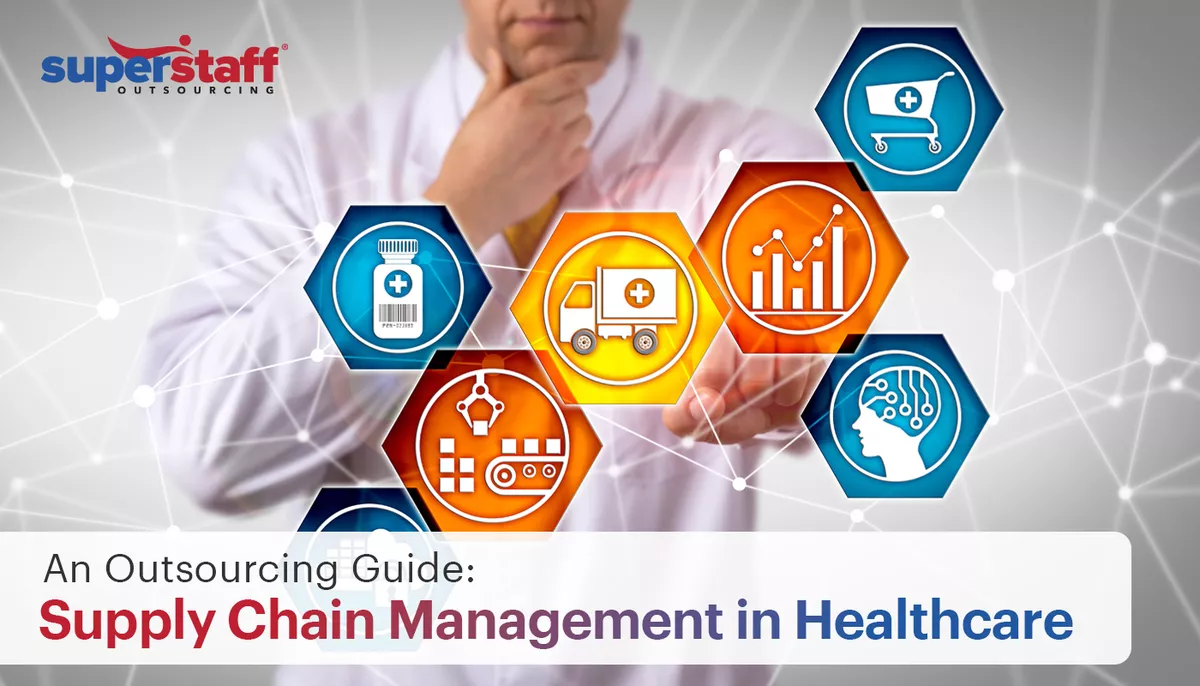
In a fast-paced sector where every moment is critical and patient well-being is the top priority, efficient supply chain management isn’t just a necessity; it’s a lifeline. Beyond its impact on inventory and logistics; it also directly affects patient care, safety, and the financial stability of healthcare institutions.
However, despite supply chain management’s crucial role in the healthcare industry, it is not immune from challenges. Supply chain disruptions have catastrophic consequences, including critical shortages, treatment delays, and rising costs. In the face of these obstacles, there’s a strategic solution that helps safeguard the integrity of this vital lifeline: outsourcing.
With the help of third-party specialists, outsourcing drives down costs, streamlines healthcare supply chain operations, and ensures efficient inventory management across all supply chain links.
Let’s explore the infographic below to gain a better understanding of what supply chain management is and how it affects healthcare.
Understanding the Healthcare Supply Chain Landscape
The healthcare supply chain guarantees the seamless flow of essential products and equipment, from pharmaceuticals to surgical instruments. Here are some of the critical components of the supply chain and why they’re vital to the industry.
-
Suppliers
Suppliers serve as the bedrock of the healthcare supply chain. They encompass various entities, from pharmacological manufacturers to medical equipment and consumables providers. These suppliers produce and deliver vital healthcare products.
Since they are the initial point of the supply chain, disruptions in this early stage can cause critical shortages, affecting patient care and safety.
-
Manufacturers
Manufacturers take on the crucial role of transforming raw materials into the medical devices, pharmaceuticals, and equipment that healthcare providers depend on daily.
The efficiency and quality of their manufacturing procedures directly impact the availability and reliability of healthcare supplies. Delays or errors at this stage can ripple throughout the supply chain, ultimately affecting patient care and outcomes.
-
Distributors
Acting as intermediaries in the supply chain, distributors efficiently move products from manufacturers to healthcare providers. Their responsibilities include maintaining inventory levels, ensuring on-time deliveries, and managing logistics.
Since ensuring timely and accurate deliveries is paramount in healthcare, distributors act as a linchpin in the supply chain, bridging the critical gap between supply and demand.
-
Healthcare providers
These are the end-users of the healthcare supply chain, including hospitals, clinics, and healthcare facilities. Healthcare providers rely on a continuous and dependable supply of products and equipment to offer timely and effective patient care.
Any interruptions in the supply chain can have immediate and far-reaching consequences for healthcare providers, affecting patients’ access to essential treatments and services.
Challenges in Healthcare Supply Chain Management
Healthcare organizations grapple with many challenges that can significantly impact patient care, financial stability, and operational efficiency. Let’s take a closer look at these challenges.
-
Cost Pressures
The healthcare industry is no stranger to the prevalent and relentless spikes in the cost of healthcare services and supplies.
Soaring prices force healthcare organizations to seek out more cost-effective supply chain solutions. Despite a drop in service demand during the pandemic, experts believe national health expenditures will surge to roughly $6.8 trillion by 2030.
Rising costs can erode budgets, limit patient care resources, and threaten financial stability. Ultimately, it’s not just about fiscal responsibility; it’s a matter of survival.
-
Regulatory Compliance
Healthcare supply chains operate within a complex web of intricate regulations governing quality control, product traceability, and safety standards.
These regulations are critical for ensuring the safety and efficacy of healthcare products. However, compliance can be a daunting challenge, especially as regulations evolve, become more stringent, and change abruptly in response to global events.
For instance, in the face of the pandemic, China implemented stricter regulations while the US tried to find new suppliers.
-
Product Recall Management
Healthcare institutions are certified experts when it comes to the tedious yet critical task of product recall management.. Prioritizing patient safety, they ensure revoked items are promptly removed from circulation and replaced with safer alternatives.
For providers, this is not just a logistical challenge, but a matter of life and death.
-
Supplier Reliability
Setbacks in the healthcare supply chain, such as delayed shipments, quality issues, or supplier insolvencies, can easily disrupt patient care. This is why supplier reliability is of utmost importance in the industry.
Healthcare providers depend heavily on the reliability of their suppliers. With patients’ lives at stake, providers require timely delivery of goods to ensure the quality of their healthcare services.
Benefits of Outsourcing in Healthcare Supply Chain Management
In an increasingly globalized healthcare landscape, outsourcing is a strategic supply chain management solution that enhances cost-effectiveness and business resilience. Check out its advantages that you can leverage for your success.
-
Cost Reduction
Outsourcing in healthcare supply chain management reduces costs through economies of scale and the expertise of BPO firms. Partners leverage their vast networks for better pricing on healthcare products. Their specialized knowledge also optimizes procurement and inventory, delivering substantial savings to healthcare organizations.
Superstaff’s Specialty Healthcare Outsourcing services, tailored to healthcare-specific needs, can provide cost-efficient solutions for inventory management and supply chain logistics.
-
Expertise and Specialization
With their vast industry experience, outsourcing partners have an in-depth understanding of the unique challenges and nuances that permeate healthcare supply chain management.
Their teams are well-acquainted with the stringent requirements, quality standards, and regulations governing the procurement, distribution, and inventory management of healthcare products.
Partnering with a provider ensures you’re not merely recipients of supply chain services but also able to keep pace with the latest industry insights, innovative practices, and unwavering commitment to regulatory compliance.
-
Focus on Core Competencies
Outsourcing in healthcare supply chain management allows organizations to refocus on their core competency: quality patient care. As experts in streamlining and optimizing operations, BPOs can reallocate resources previously used for supply chain management to crucial areas that drive growth such as staffing, research, and advanced medical technologies.
-
Scalability and Flexibility
Healthcare needs are inherently variable and influenced by seasonal changes, unforeseen healthcare crises, or shifts in patient demographics. To cope with such volatility, outsourcing provides flexibility to adapt to demand fluctuations —preventing excess inventory during slow periods and effectively meeting surges in patient requirements.
-
Risk Mitigation
Outsourcing shoulders a significant share of healthcare supply chain management risks, especially those concerned with the complex terrain of healthcare regulations and standards.
Outsourcing partners ensure compliance with intricate regulations and equip healthcare organizations with a resilient supply chain that withstands disruptions for a steady flow of essential supplies in challenging times.
Best Practices for Outsourcing Inventory Management in Healthcare
Outsourcing healthcare inventory management requires meticulous planning and adherence to best practices for smooth operations and optimal patient care. Here are the key best practices for successfully outsourcing inventory management in healthcare.
-
Vendor Selection
Having the right partner at your side is key to a successful outsourcing journey.
Choose an outsourcing firm with documented healthcare supply chain expertise, ensuring they are experienced in handling the unique demands and complexities of the healthcare sector.
Check that the selected provider holds relevant certifications, such as ISO standards or FDA approvals, critical for maintaining quality and safety in healthcare supply chains. To seek out vendors with a proven track record, you can also seek recommendations and references from other healthcare organizations they have worked with to ensure their credibility.
-
Service Level Agreements (SLAs)
Establish comprehensive SLAs that leave no room for ambiguity. Clearly define expectations regarding timely delivery, product quality, compliance with healthcare regulations, and inventory accuracy.
When it comes to tracking their performance, implement measurable performance metrics and evaluate the outsourcing partner’s SLA adherence. Regularly review and adjust these metrics as needed to maintain high standards.
-
Inventory Visibility
Implement inventory management systems that offer real-time visibility into stock levels. This facilitates accurate demand forecasting, preventing stockouts and minimizing excess inventory.
Remember to leverage data analytics for insights into inventory trends — enabling data-driven decision-making that improve inventory optimization.
-
Regulatory Compliance
In the highly regulated healthcare sector, strict adherence to compliance is absolutely crucial.
Confirm your outsourcing partner adheres to all applicable healthcare regulations and quality standards with regular audits and inspections. This will also help verify compliance and maintain product safety.
To reinforce regulatory compliance measures further, consider implementing robust traceability systems that enable the tracking of products throughout the supply chain. This is particularly critical for compliance, product recalls, and quality control.
-
Communication and Collaboration
Transparent communication sits at the core of any successful outsourcing endeavor.
Foster open and transparent communication channels with your partner through regular meetings, feedback mechanisms, and escalation procedures that can help address issues promptly.
Collaborate closely with your chosen partner to address challenges, adapt to changing circumstances, and align strategies to meet evolving healthcare needs. This approach ensures a seamless and responsive supply chain that will help you deliver quality healthcare services
Unlock Peak Healthcare Excellence Through Outsourcing
The complexities and challenges of healthcare supply chain management make outsourcing a beacon of efficiency, expertise, and risk mitigation.
We urge healthcare organizations to consider customer service outsourcing in the Philippines as a strategic path to greater efficiency, cost-effectiveness, and superior patient care standards.
With over a decade of experience under our belt, SuperStaff is equipped to be your strategic ally in outsourcing to the Philippines. Our expertise in multilingual customer service and specialty healthcare outsourcing helps us understand the industry’s unique demands — from supply chain management to back-office support solutions.
Contact us today and begin your journey into healthcare excellence with our onshore and nearshore call centers.







